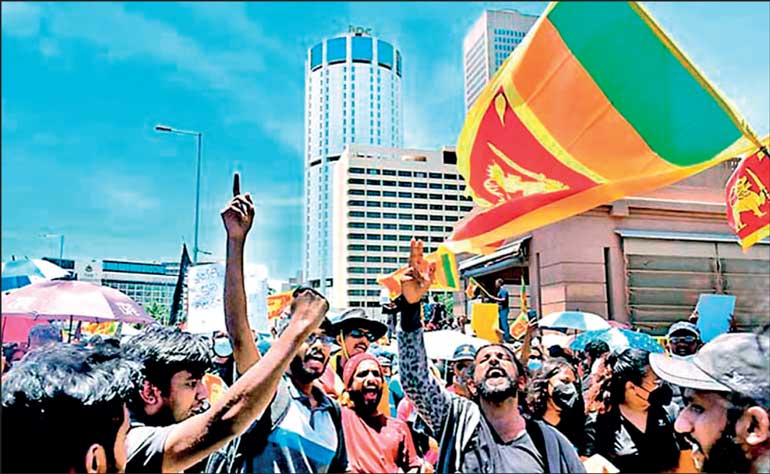Wednesday Feb 18, 2026
Wednesday Feb 18, 2026
Saturday, 17 September 2022 00:00 - - {{hitsCtrl.values.hits}}

Out of the economic collapse of the country has arisen the ‘Aragalaya’; ill-defined, ill-directed and leaderless it may be, yet in this desolate land, it is the one spark that promises renewal, an avowal of self-respect, a declaration that the entire nation is not prostrate before the system. From such sparks do conflagrations come
“Unhappy the land that is in need of heroes”
“Because things are the way they are; things will not stay the way they are” – Bertolt Brecht
 There was this recent WhatsApp post offering an analysis of the Mahinda Rajapaksa political phenomenon which I thought merits some consideration, particularly in view of the deplorable situation the country finds itself in today. The post is anonymous, written somewhat loosely, in the manner of a political polemic, the message nevertheless hits home.
There was this recent WhatsApp post offering an analysis of the Mahinda Rajapaksa political phenomenon which I thought merits some consideration, particularly in view of the deplorable situation the country finds itself in today. The post is anonymous, written somewhat loosely, in the manner of a political polemic, the message nevertheless hits home.
To quote randomly, “More than half a century after the British left, Sri Lanka has found its truly representative leader – Mahinda Rajapaksa. MR is what Sri Lanka is. It is Rajapaksa’s view of the world, and a degree of his morality (or, rather immorality) that most Sri Lankans have. Rajapaksa’s lack of values is just the same as what many of us lack…Sri Lankans are a corrupt lot, like the Philippines…Today the Central Bank does not know details of what the country owes foreign lenders, the accounts are purposely obfuscated… The good systems the British left us were bastardised to meet the corrupt objectives of politicians and senior public servants. Institutions like the CEB are dens of thieves…”
In short, people get the governments they deserve.
Individuals may differ, in the collective however there is a discernible homogeneity, a particular way of looking at things, a commonness of impulse. After all, we are the sum of our upbringing, culture, beliefs, even climate and diet; all adding to the mix of what becomes a ‘people’. If our leaders are in fact our representation, what has happened since 1948, can only be a manifestation of a society shot through with mediocrities of every manner. What we admire, look up to, and embrace in our leadership, has only led us to the bankruptcy we have become.
Perhaps in a more damaging way than generally realised, for about 20 years now Sri Lankan politics has been distorted by two individuals, Mahinda Rajapaksa and Ranil Wickremesinghe. Despite their very long stays at the top of the pyramid, neither of them can claim credible Statesmanship, nor, point to exceptional nation building efforts. It is the very opposite which predominates in their character; lack of credibility, patchy performance, doubtful reputation; in vital constitutional matters not only clumsy, they are both obviously false. And, as to nation building, all the obscurantism they resort to, cannot hide the dismal state of the country.
The political dominance of these two individuals is due to another reason, the complete possession of a major political party (PA/SLPP and the UNP). In what is essentially a two-party system, leadership in one, ensures regular bites at the cherry.
Our so called political parties cannot be compared with those of the mature democracies. Lacking any deep going ideology, ours are political configurations hastily put together to capitalise on perceived political opportunities. When the immediacy of that occasion passes, the followers, personally inadequate and socially inept, gather around a strong man, calling that amalgam a political party. For his followers it is their main chance, when the party gains power the plum jobs in the public sector are grabbed greedily; the political appointees, besides diminishing these public institution, plunder them to the bone.
For a long time Ranil Wickremesinghe was touted as a foil to a roguish Rajapaksa. If Rajapaksa was opportunistic, devious and unprincipled, Wickremesinghe was the antithetical alternative, the narration went. Particularly in the Colombo society, no ethical or intellectual powerhouse, many a theses were advanced to vindicate Wickremesinghe; his supposed omniscience, sophistication, the universal acclaim of his personality. Even from such an enervated social elite, one would have expected better.
|
In any other country, the verdict of the General Elections of 2020 would have been the end of Ranil Wickremesinghe’s politics. The once mighty UNP, the then ruling party, was reduced to zero seats, obtaining only about 200,000 votes in the entire country. Even Wickremesinghe talked of retirement, hinting portentously that in his leisure he may take up literary pursuits, perhaps unravel the mysteries of a nation’s continuous failure or an esoteric exploration of the metaphysics of attachment, the meaning of being, knowing and time.
Then, what about the prosaic issue of the bonus seat those 200,000 votes entitles the UNP?
He was specious, even disingenuous, let the party decide their nominee he said. It is clear that the UNP rump is totally possessed by him, it has no will and has no thoughts, other than his. Duplicating what had become the common chorus of the PA/SLPP (the loud cry for the leadership of the Rajapaksa family), the UNP in one voice called for the defeated MP Wickremesinghe, the several times Prime Minister, to fill the concessionary seat in Parliament. It was said that even Mahinda Rajapaksa the then Prime Minister, his putative ideological rival, a man vilified on the UNP stage for every kind of abuse and misuse, also urged Wickremesinghe to come to Parliament. And, he came.
The rest is recent history. In for a penny, in for a pound; unelected, Ranil Wickremesinghe not only became a member of parliament, he went on to become the Executive President of the country. If democracy is to have any meaning, for good governance to be good, those who decide for the people must have a mandate from the people. Any system that violates this unnegotiable principle, any constitution which permits the usurpation of the people’s sacred right to elect their rulers, is fundamentally flawed, and in the eyes of social justice stands abolished.
In every system, there is provision for succession in the event of the death or incapacity of an incumbent official. In the United States, if the President were to die, the Vice President would follow. The Americans are aware of this when they vote for the team (Presidential candidate and his running mate). In other countries, say the United Kingdom, if the Prime Minister were to die, it is most likely that the deputy leader of his party succeeds. The people have voted for that party, if an eventuality were to occur, they can reasonably anticipate such a succession. Invariably, a successor so elevated, well aware of his lack of a direct mandate, will work towards an election at the earliest, enabling the people to choose the leader they want.
What happened in Sri Lanka is unique in the annals of democracy, a person rejected at the general elections, not only enters the House of Representatives (unelected), he ends up being the President of the country. If not for the tragic reality of this blatant violation (of the principle of representative government), this is a hilarity, scarcely believable in the modern world. In the 70 years since independence not only has Sri Lanka shown its incapacity to create a prosperous society, we have proved that our attempts at writing constitutions and laws only end up achieving the very opposite of what was intended, in this case, allowing the open violation of the concept of a people’s mandate.
After the harrowing events of the last few years, not only Ranil Wickremesinghe, it is extremely doubtful whether the Government itself has the mandate to rule in the name of the people any longer. It is not conceivable that the people gave a mandate to create the economic hell Sri Lanka has now become. Our Rupee has no value, inflation is rampant and the economy is contracting. Presently, in this land of plentiful sunshine and rain, a crippling blow is being administered to the householders in the way of ridiculously increased electricity as well as water bills. The absurdly inflated egos of our politicians may allow them to imagine heroic roles for themselves; carrying babies across rushing rivers in faraway lands. In their self-induced adrenaline rush, they seem to forget that both the Electricity Board and the Water Board here in this country, were their babies for several decades now. Where have they taken them to?
The unwritten social contract between the people and their representatives is surely at an end. Here again, our representatives have written out of the constitution, the possibility of calling for a by-election, even for a single electorate. If such a mini-election were possible, the canard that this Government commands a mandate will be exploded. As it stands, the constitution enables an existing government to abuse its powers untrammelled, as long as it commands a majority in parliament. A case of bad taste being enthroned and empowered.
In Sri Lanka, a parliamentary majority can be constituted in different ways, even trespassing ordinary rules of decency. Members elected through other parties can be induced to join the government ranks, there are but a few who can resist the perks that come with Ministerial positions. Barren, their minds may be when it comes to nation building, however when finding reasons to betray their voter, they are very fertile; ‘to strengthen the hand of the President’.’ to work for my community’, ‘to develop my electorate’ ‘to save the nation’, are some of the reasons given to justify their crossing over to the Government ranks. These coarse, oleaginous personalities, doing these high sounding things – and pigs can fly! Who is to save us from those who want to save us!
In the crossing of the floor (of Parliament), there is a betrayal not only of the voter but of the member himself. For example, a member may have won his seat because his voters dislike Rajapaksa, therefore voting for him as a voice against Rajapaksa. However, having come to Parliament on that basis, he crosses the floor to become a cabinet minister in a Rajapaksa government! In effect, the turncoat member, denies himself.
There is also the open secret to consider, politicians on the Government side become rich, some very rich, running the Government!
Although very few saw it coming, the unity between the Rajapaksa camp and Ranil Wickremesinghe is the most natural outcome of parliamentary politics as they have evolved in this country for some time now. There is no need for them to parley, they have perfect understanding, and common interests make them fellow travellers, a conspiracy against the people, and defenders of a system that serves them richly.
Out of the economic collapse of the country has arisen the ‘Aragalaya’; ill-defined, ill-directed and leaderless it may be, yet in this desolate land, it is the one spark that promises renewal, an avowal of self-respect, a declaration that the entire nation is not prostrate before the system.
From such sparks do conflagrations come.